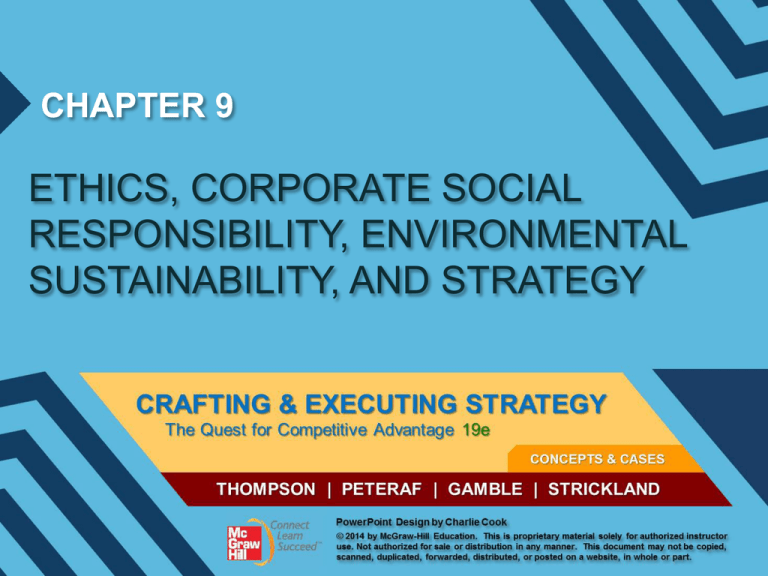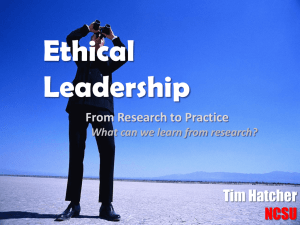C9x - University at Albany
advertisement

CHAPTER 9 ETHICS, CORPORATE SOCIAL RESPONSIBILITY, ENVIRONMENTAL SUSTAINABILITY, AND STRATEGY 1. Understand how the standards of ethical behavior in business are no different from the ethical standards and norms of the larger society and culture in which a company operates. 2. Recognize conditions that can give rise to unethical business strategies and behavior. 3. Gain an understanding of the costs of business ethics failures. 4. Learn the concepts of corporate social responsibility and environmental sustainability and how firms balance these duties with economic responsibilities to shareholders. 9–2 WHAT DO WE MEAN BY BUSINESS ETHICS? Business Ethics ● Is the application of general ethical principles to the actions and decisions of businesses and the conduct of their personnel. ● Are not materially different from ethical principles in general because business actions have to be judged in the context of society’s standards of right and wrong. 9–3 CORE CONCEPTS ♦ Ethics concerns principles of right or wrong conduct. ♦ Business ethics involves the application of general ethical principles to the actions and decisions of businesses and the conduct of their personnel. 9–4 WHERE DO ETHICAL STANDARDS COME FROM—ARE THEY UNIVERSAL OR DEPENDENT ON LOCAL NORMS? Sources for Ethical Standards The School of Ethical Universalism The School of Ethical Relativism Integrated Social Contracts Theory 9–5 THE SCHOOL OF ETHICAL UNIVERSALISM Ethical Universalism ● Holds that common understandings across multiple cultures and countries about what constitutes right and wrong give rise to universal ethical standards that apply to all societies, all firms, and all businesspeople. Effect on Business Ethics ● Whether a business-related action is right or wrong is judged by universal standards. 9–6 THE SCHOOL OF ETHICAL RELATIVISM Ethical Relativism ● Holds that differing beliefs, customs, and behavioral norms across countries and cultures give rise to multiple sets of standards of what is ethically right or wrong. Effect on Business Ethics ● Whether business-related actions are right or wrong depends on local ethical standards. 9–7 CORE CONCEPT ♦ The school of ethical relativism holds that differing religious beliefs, customs, and behavioral norms across countries and cultures give rise to multiple sets of standards concerning what is ethically right or wrong. These differing standards mean that whether business-related actions are right or wrong depends on the prevailing local ethical standards. 9–8 EXAMPLES OF ETHICAL RELATIVISM ISSUES Variations in Ethical Standards The Use of Underage Labor The Payment of Bribes and Kickbacks Relativism Equates to Multiple Sets of Standards The Use of Local Morality to Guide Ethical Behavior 9–9 ILLUSTRATION CAPSULE 9.1 Apple’s Failures in Enforcing Its Supplier Code of Conduct ♦ How effective has Apple’s Supplier Code of Conduct been is reducing abuses of workers at its supplier facilities? ♦ Is it fair for Apple to prescribe that its suppliers comply with universal standards that are at wide variance relative to local market labor practices and conditions? 9–10 STRATEGIC MANAGEMENT PRINCIPLE ♦ Codes of conduct based on ethical relativism can be ethically dangerous for multinational companies by creating a maze of conflicting ethical standards. 9–11 CORE CONCEPT ♦ According to integrated social contracts theory, universal ethical principles based on the collective views of multiple societies form a “social contract” that all individuals and organizations have a duty to observe in all situations. ♦ Within the boundaries of this social contract, local cultures or groups can specify what additional actions may or may not be ethically permissible. 9–12 STRATEGIC MANAGEMENT PRINCIPLE ♦ According to integrated social contracts theory, adherence to universal or “first-order” ethical norms should always take precedence over local or “second-order” norms. ♦ In instances involving universally applicable ethical norms (like paying bribes), there can be no compromise on what is ethically permissible and what is not. 9–13 INTEGRATIVE SOCIAL CONTRACTS THEORY Provides a middle-ground balance between universalism and relativism. Posits that the collective views of multiple societies form universal (first order) ethical principles that all persons have a contractual duty to observe in all situations. Within the contract, cultures or groups can specify locally ethical (second-order) actions. 9–14 APPLICATION OF INTEGRATED SOCIAL CONTRACTS THEORY TO MULTINATIONAL BUSINESS Effects on Ethical Standards: ● Adherence to universal ethical norms takes precedence over local norms. ● A local custom is not ethical if it violates universal ethical norms. ● Application of codes of ethics should first follow universal standards with allowance for local ethical diversity and influence. 9–15 HOW AND WHY ETHICAL STANDARDS IMPACT THE TASKS OF CRAFTING AND EXECUTING STRATEGY The Ethics Code Litmus Test: ● Is what we are proposing to do fully compliant with our code of ethics? Are there areas of ambiguity? ● Is this action in harmony with our core values? Are any conflicts or potential problems evident? ● Is this action ethically objectionable? Would our stakeholders, our competitors, the SEC under the Sarbanes-Oxley Act, or the news and social media view this action as ethically objectionable? 9–16 CONSEQUENCES OF ETHICALLY QUESTIONABLE STRATEGIES When Strategies Fail the Ethical Litmus Test Sizable civil fines and stockholder lawsuits Devastating image and public relations hits Sharp stock price drops as investors lose confidence Criminal indictments and convictions 9–17 WHAT ARE THE DRIVERS OF UNETHICAL STRATEGIES AND BUSINESS BEHAVIOR? Faulty Oversight and Self Dealing Pressure for Shortterm Performance Unethical Strategies and Business Behaviors A Weak or Corrupt Ethical Environment 9–18 WHAT ARE THE DRIVERS OF UNETHICAL STRATEGIES AND BUSINESS BEHAVIOR? Drivers of Unethical Business Behavior: ● Faulty internal oversight allows self-dealing in the pursuit of personal gain, wealth, and self-interest. ● Short-termism pressure to meet or beat short-term performance targets. ● A culture that puts profitability and business performance ahead of ethical behavior. 9–19 CORE CONCEPT ♦ Self-dealing occurs when managers take advantage of their position to further their own private interests rather than those of the firm. ♦ Short-termism is the tendency for managers to focus excessively on short-term performance objectives at the expense of longer-term strategic objectives. It has negative implications for the likelihood of ethical lapses as well as company performance in the longer run. 9–20 ILLUSTRATION CAPSULE 9.2 Investment Fraud at Bernard L. Madoff Investment Securities and Stanford Financial Group ♦ Which drivers of unethical behavior were active in the Madoff investment fraud scheme? ♦ How did the cultures of the Madoff and Stanford investment firms assist in perpetuating the frauds? ♦ What ethical responsibilities were lacking in the Madoff fraud’s investors that would have helped prevent the frauds? 9–21 ILLUSTRATION CAPSULE 9.3 How Novo Nordisk Puts Its Ethical Principles into Practice ♦ What steps has Novo Nordisk taken to ensure that its ethical standards of employee conduct are put into practice? ♦ Why has Novo Nordisk been so successful instilling a culture of ethical conduct in its organization when other firms have not? ♦ What has been the effect of Novo Nordisk’s dedication to ethical business practices on its success in the marketplace? 9–22 WHY SHOULD COMPANY STRATEGIES BE ETHICAL? The Moral Case for an Ethical Strategy: ● Because a strategy that is unethical is morally wrong and reflects badly on the character of the firm’s personnel. The Business Case for Ethical Strategies: ● Because an ethical strategy can be both good business and serve the self-interest of shareholders. 9–23 STRATEGIC MANAGEMENT PRINCIPLE ♦ Conducting business in an ethical fashion is not only morally right—it is in a company’s enlightened self-interest. ♦ Shareholders suffer major damage when a company’s unethical behavior is discovered. Making amends for unethical business conduct is costly, and it takes years to rehabilitate a tarnished company reputation. 9–24 FIGURE 9.1 The Costs Companies Incur When Ethical Wrongdoing Is Discovered 9–25 STRATEGY, CORPORATE SOCIAL RESPONSIBILITY, AND EVIRONMENTAL SUSTAINABILITY Corporate Social Responsibility (CSR) ● Is a firm’s duty to operate in an honorable manner, provide good working conditions for employees, encourage workforce diversity, be a good steward of the environment, and actively work to better the quality of life in the local communities where it operates and in society at large. 9–26 CORE CONCEPT ♦ Corporate social responsibility (CSR) refers to a company’s duty to operate in an honorable manner, provide good working conditions for employees, encourage workforce diversity, be a good steward of the environment, and actively work to better the quality of life in the local communities where it operates and in society at large. 9–27 FIGURE 9.2 The Five Components of a Corporate Social Responsibility Strategy 9–28 ILLUSTRATION CAPSULE 9.4 Burt’s Bees: A Strategy Based on Corporate Social Responsibility ♦ How has Burt’s Bees skillful use of corporate social responsibility (CSR) as a strategic tool contributed to its success in the marketplace? ♦ Given that many customers now purchase personal care products online, how do they determine that firms such as Burt’s Bees really are practicing CSR? ♦ Why was there a customer backlash to The Clorox Company’s acquisition of Burt’s Bees? 9–29 FIGURE 9.3 The Triple Bottom Line: Excelling on Three Measures of Company Performance People Profit Planet 9–30 TABLE 9.1 A Selection of Companies Recognized for Their Triple-Bottom-Line Performance in 2011 9–31 WHAT DO WE MEAN BY SUSTAINABILITY AND SUSTAINABLE BUSINESS PRACTICES? Sustainability ● Is the relationship of a firm to its environment and its use of natural resources. Sustainable Business Practices ● Are those practices of a firm that meet the needs of the present without compromising the ability to meet the needs of the future. 9–32 CORE CONCEPTS ♦ Sustainable business practices are those that meet the needs of the present without compromising the ability to meet the needs of the future. ♦ An environmental sustainability strategy consists of a firm’s deliberate actions to protect the environment, provide for the longevity of natural resources, maintain ecological support systems for future generations, and guard against the ultimate endangerment of the planet. 9–33 SUSTAINABILITY AND SUSTAINABLE BUSINESS PRACTICES Environmental Sustainability Strategy ● Consists of the firm’s deliberate actions to: Protect the environment. Provide for the longevity of natural resources. Maintain ecological support systems for future generations. Guard against ultimate endangerment of the planet. 9–34 CRAFTING CORPORATE SOCIAL RESPONSIBILITY AND SUSTAINABILITY STRATEGIES Pursuing a Sustainable CSR Strategy in the Firm’s Value Chain Activities Moral Case: Stakeholder Benefits Business Case: Competitive Advantage 9–35 STRATEGIC MANAGEMENT PRINCIPLE ♦ CSR strategies and environmental sustainability strategies that both provide valuable social benefits and fulfill customer needs in a superior fashion can lead to competitive advantage. Corporate social agendas that address only social issues may help boost a company’s reputation for corporate citizenship but are unlikely to improve its competitive strength in the marketplace. 9–36 THE MORAL CASE FOR CSR AND ENVIRONMENTALLY SUSTAINABLE BUSINESS PRACTICES The Implied Social Contract: “To Do the Right Thing” Operate ethically and legally Provide good work conditions for employees Be a good environmental steward Display good corporate citizenship 9–37 STRATEGIC MANAGEMENT PRINCIPLE ♦ Every action a company takes can be interpreted as a statement of what it stands for. 9–38 THE BUSINESS CASE FOR CSR AND ENVIRONMENTALLY SUSTAINABLE BUSINESS PRACTICES Increased reputation and buyer patronage Reduced risk of reputation-damaging incidents Lower turnover costs and enhanced employee recruiting and workforce retention Increased revenue enhancement opportunities due to support of CSR and sustainability CSR and sustainability best serve long-term interests of shareholders 9–39 COMBATING THE EVASION OF CSR AND SOCIALLY HARMFUL BUSINESS PRACTICES Increased public awareness of misdeeds of bad behavior by firms Increased legislation and regulation to correct and punish firms Harmful and Unethical Business Actions and Behaviors Refusal to do business with irresponsible firms 9–40 STRATEGIC MANAGEMENT PRINCIPLE ♦ The higher the public profile of a company or its brand, the greater the scrutiny of its activities and the higher the potential for it to become a target for pressure group action. 9–41 STRATEGIC MANAGEMENT PRINCIPLE ♦ Socially responsible strategies that create value for customers and lower costs can improve company profits and shareholder value at the same time that they address other stakeholder interests. ♦ There’s little hard evidence indicating shareholders are disadvantaged in any meaningful way by a company’s actions to be socially responsible. 9–42









